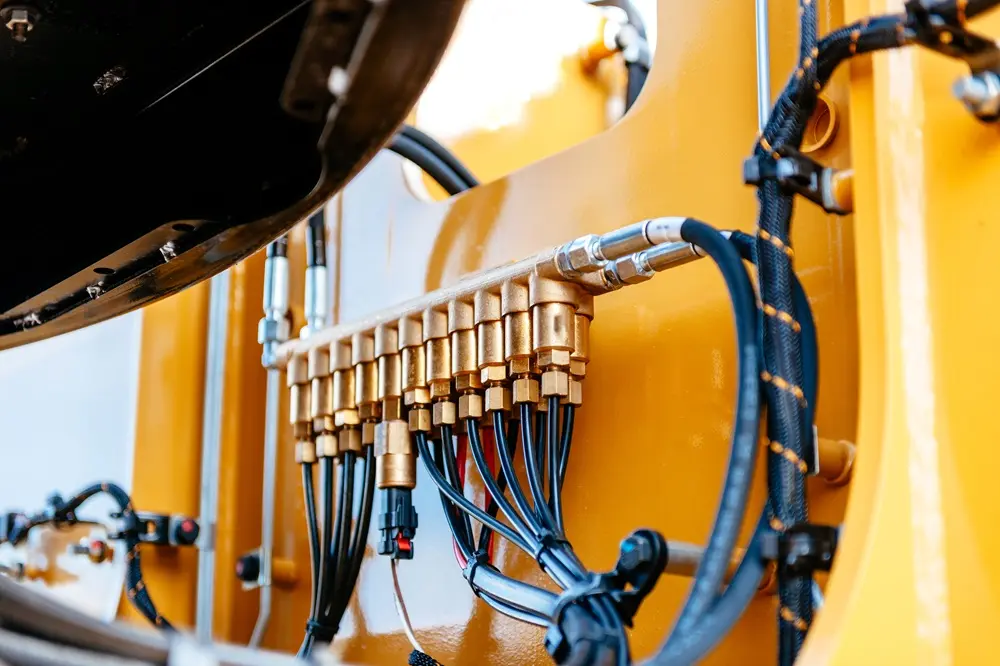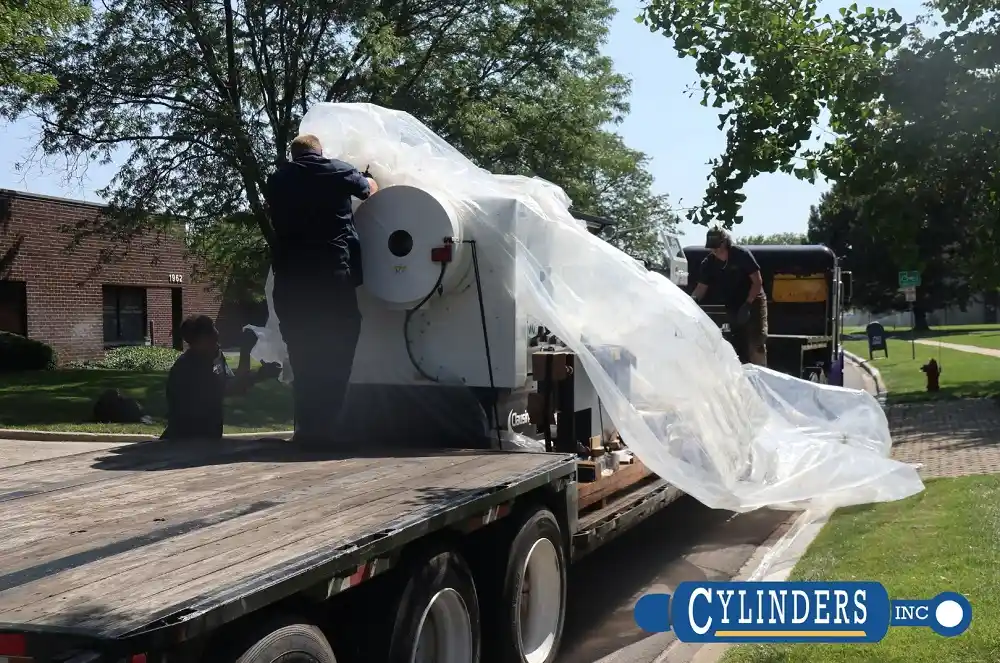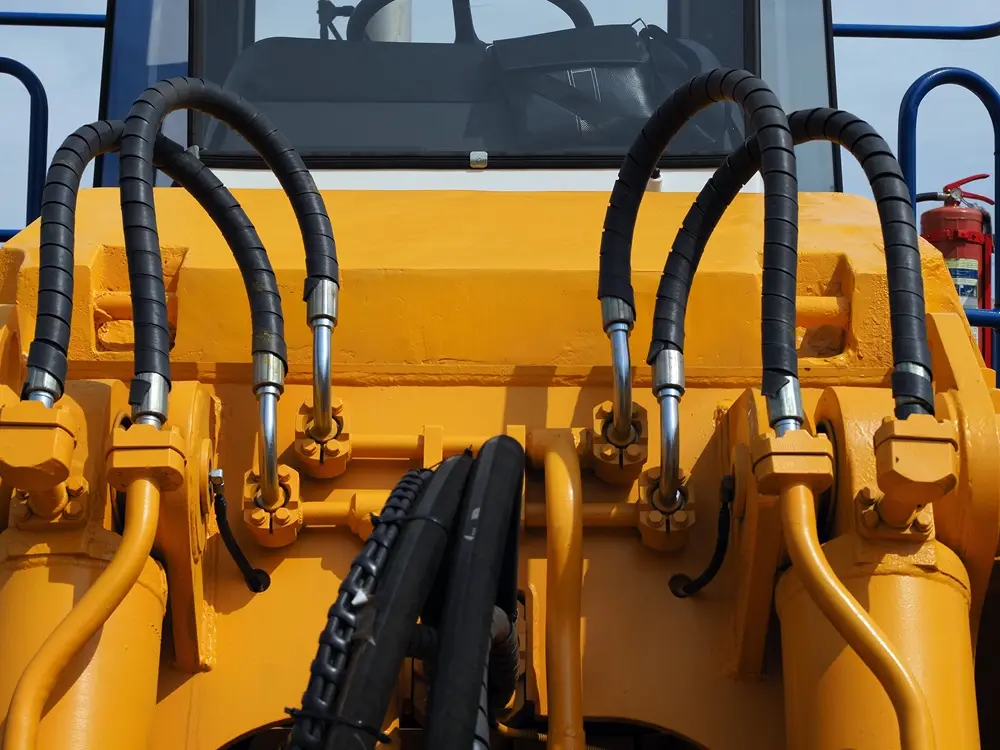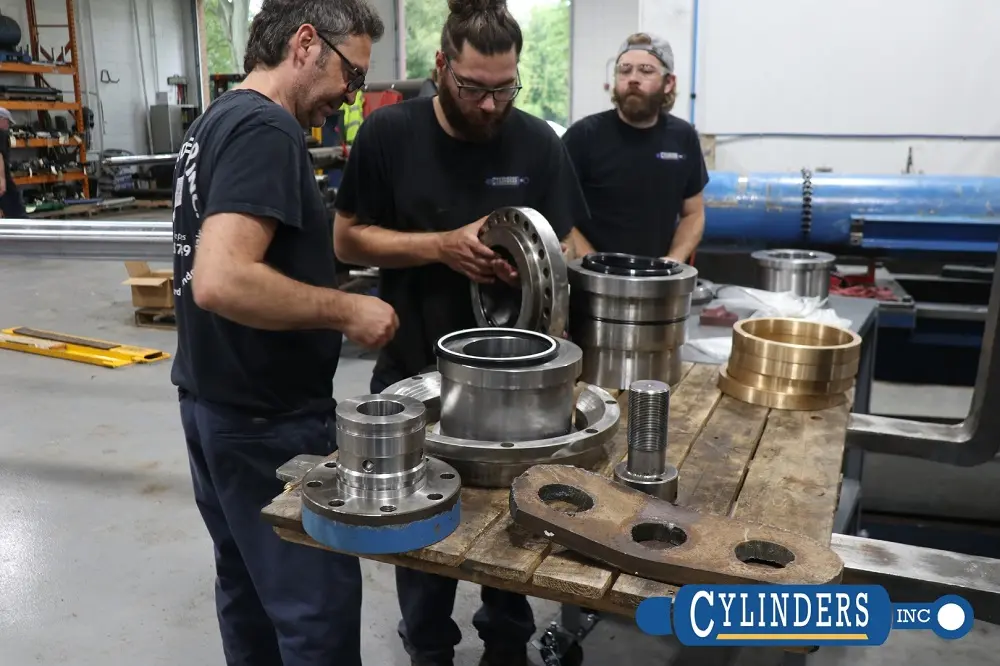Working with hydraulic systems poses serious risks. Learn key hydraulic safety precautions and how to avoid hazards like high-pressure fluid leaks.

Hydraulic systems are commonly used in machinery and equipment across industries to generate tremendous forces and motion through pressurized hydraulic fluid. Cylinders, pumps, valves, and motors allow hydraulics to perform heavy lifting, pressing, bending, and other mechanical work. However, these powerful systems can be hazardous if proper safety precautions aren’t followed.
At Cylinders, Inc., we want to emphasize the importance of hydraulic safety protocols. Operating and maintaining hydraulic machinery requires focus, training, and preventative actions to avoid severe injuries or accidents. In this article, we’ll cover essential hydraulic cylinder repair and maintenance safety.
Hydraulic systems can pose inherent hazards, so it’s important to understand these risks to ensure safe operation and prevent accidents.

Improper couplings in hydraulic systems, particularly when dealing with hydraulic hoses, can be dangerous. When a low-pressure component is mistakenly connected to a high-pressure system, it can lead to catastrophic failures, including hose blowouts or sudden releases of pressurized fluid. To prevent such hazards, you’ll need to ensure that couplings are properly matched and rated for the specific pressure requirements of the hydraulic system. Regular inspections and adhering to manufacturer’s guidelines are key for maintaining the integrity and safety of hydraulic system couplings.
The interaction of electrical components and stored energy within the system can lead to potential risks. For example, accidental contact with live electrical wires or improper grounding can result in electrical shock or fires. You’ll need to follow proper lockout/tagout procedures, use insulated tools, and ensure proper grounding to mitigate electrical hazards when working with hydraulic systems.
Pinhole leaks in hydraulic lines can lead to severe injuries. Hydraulic fluid, under high pressure, can forcefully escape through these tiny openings and cause the release of pressurized oil. It can result in fluid injection injuries, burns, and other hazards. It’s important to take immediate action to relieve hydraulic pressure and properly repair the leak to ensure the safety of those working with or around hydraulic systems. Another helpful tip is to participate in regular inspections and maintenance to identify and prevent pinhole leaks in the hydraulic line.
Understanding the hazards associated with component removal or adjustment in hydraulic systems is essential as working with hydraulic equipment while it’s under pressure can be extremely dangerous. Components such as valves, connectors, or hoses may unexpectedly release hydraulic pressure that leads to sudden movement or injury. Before removing or adjusting any components, it’s vital to relieve hydraulic pressure and ensure you follow all safety measures to prevent accidents and injuries.
Hydraulic system safety precautions are crucial for establishing a safe and efficient working environment. We’ve outlined the top 10 precautions to keep in mind.
Hydraulic system precautions include operating the system only for its intended purposes. It’s essential to avoid using the hydraulic system for tasks it wasn’t designed for, as this can lead to excessive pressure, stress on the hydraulic components, and potential system failure. Following manufacturer guidelines and using the hydraulic system within its specified limits ensures the safe and efficient operation of the system. It also helps prevent damage to the hydraulic lines and other components.

Before operating a hydraulic system, inspect it thoroughly for low hydraulic oil fluid levels, signs of leaks, loose fittings, cracked hoses, or any other issues. Addressing potential problems ahead of time can prevent system failures or accidents caused by malfunctioning hydraulics during operation.
If you discover an escaping oil or hydraulic fluid leak anywhere in the hydraulic system, this is your sign to not operate the system. Leaking hydraulic fluid is a hazard and can lead to pump failure or other damage. Before use, ensure any leaks are thoroughly repaired to prevent unsafe drops in fluid levels or system malfunctions. You’ll need to address the source of the leak to stop additional hydraulic oil from escaping.
Hydraulic systems operate under tremendous pressure. If the hydraulic system overheats, loses pressure, or suddenly stops working during operation, shut it down immediately. Continuing to use a faulty high-pressure hydraulic system can lead to dangerous malfunctions, high-pressure sprays, or system failures. Remember that your safety relies on properly maintaining hydraulic equipment and immediately addressing any issues that arise.

It sounds simple, but when handling hydraulic systems, wearing the proper personal protective equipment (PPE) is essential for ensuring safety. PPE such as safety glasses, gloves, and protective clothing shields against potential hazards such as high-pressure fluid leaks, flying debris, or accidental contact with moving parts. By wearing the appropriate PPE, you can minimize the risk of injuries and protect yourself from the potential dangers associated with hydraulic systems. Adhere to safety protocols and regulations to create a safer working environment with hydraulic systems.
When working with hydraulic systems, never put your hands, face, arms, or any other body parts into or near moving components. The pumps, motors, cylinders, control valves, and other parts present crushing and cutting hazards. Maintain a safe distance from all moving hydraulic parts, even when the system is shut down. Following hydraulic safety protocols protects operators from severe injury caused by powerful moving mechanisms.
Proper lockout-tagout (LOTO) procedures are also important when performing maintenance or repairs on hydraulic systems. LOTO involves isolating energy sources, such as hydraulic pumps, motors, and cylinders, to prevent accidental start-up or release of stored energy.
To implement LOTO correctly, follow these steps:
Following these procedures can keep personnel safe working on hydraulic systems.

Hydraulic system operators must verify that they have received proper training on how to use the system correctly. To prevent accidents and prioritize safety, understanding the functions, controls, and potential risks associated with hydraulic systems is crucial. Proper training gives operators the knowledge and skills necessary to operate the system safely, assess potential hazards, and respond appropriately in case of emergencies. Compliance with training requirements enhances the overall safety and efficiency of hydraulic system operations.
Ensuring the safety of hydraulic systems entails regular maintenance and upkeep. By conducting routine inspections, identifying and rectifying potential issues, and adhering to proper maintenance protocols, you can mitigate risks and uphold the reliable operation of your hydraulic system. Don’t overlook the importance of maintaining your hydraulic system for optimal performance.
Last but not least, in hydraulic system safety, always prioritize emergency response preparedness. This involves having a well-defined emergency response plan in place, which outlines the importance of prompt and effective actions in case of emergencies.
Here are some key steps for responding to hydraulic system emergencies:
It’s important to follow proper procedures for addressing fluid leaks or hydraulic system failures. Organizations should prioritize emergency response preparedness to minimize potential damages and protect their personnel.
.webp)
Working safely around high-pressure hydraulics requires knowledge, preparation, and focus. Always keep a safe distance from moving components, wear proper PPE, and follow lockout/tagout procedures. While powerful hydraulic systems allow us to accomplish incredible mechanical feats, they can also seriously injure operators if misused.
We hope this article provided useful safety tips to help prevent accidents when maintaining your hydraulic equipment. As you can tell, safety should always come first. For professional hydraulic cylinder repairs, contact the team of experts at Cylinders, Inc. today. Our team is happy to assist you!
Explore articles on cylinder repair, maintenance best practices, and manufacturing insights.
To all who’ve been part of our journey this year,As we come to the close of another year, I would like to take a moment to thank you — our valued customers, partners, and colleagues — for the continued trust you place in Cylinders, Inc. Every day, our team has the privilege of supporting the businesses that keep America’s construction, industrial, and manufacturing sectors moving. It’s a responsibility we take seriously, and one we work hard to uphold with every repair, inspection, and consultation.
When winter takes hold across the United States, it’s more than just a dusting of white that greets commuters, it’s a full-scale challenge to keep roads open, fleets operational, and heavy machinery ready. Many U.S. states see between 40 and 70 inches of snow each year, with Vermont averaging about 89 inches annually and Michigan […]